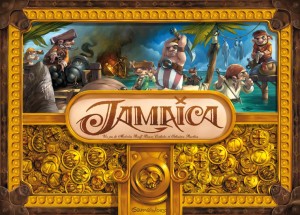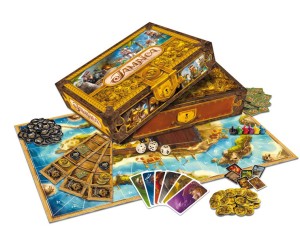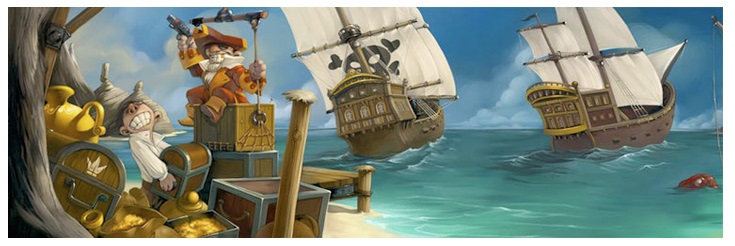

Set during the golden age of piracy, Jamaica enables two to six players to take on the role of legendary pirate captains collecting treasure, and looting one another as they race around the titular island, competing not just to see who can be the first to return to Port Royal, but also how full of Spanish gold their cargo holds will be by the end of it.
Designed by Malcolm Braff, Bruno Cathala, and Sébastian Pauchon, Jamaica has had a few publishers since debuting in 2007, and is currently in the hands of the Swiss GameWorks SàRL.
Gameplay
Like many racing games, Jamaica’s core mechanic is roll-and-move. What makes the game unique is just how that mechanic is implemented.
During set-up, each player chooses a pirate captain, and receives a deck of action cards, as well as a board representing their ship’s cargo hold. Though the back of the action card decks each bear the name of a famous pirate captain, they’re functionally identical; all the decks have the same cards. Each action card has two of five icons on it – move forward, move back, or collect either gold doubloons, food, or gunpowder – one representing a morning action, and one for the evening.
The action cards are played after the first player each round – the Captain – rolls a pair of dice and chooses one to correspond to the morning, and the other the evening. All the players then select an action card from their hand of three. After all the players have picked their action card, they go around the table, beginning with the Captain, and perform those actions, either moving a corresponding number of spaces on the board, or loading that amount of cargo into their hold. Morning actions are performed before evening actions, and after all the players have completed their actions, the Captain’s compass token moves on to the next player and a new round begins, until a player manages to circle the island and return to the starting point.
It’s just that simple. Well, there’s also hidden treasure you can collect from pirate coves along the way, varying resource costs – either food or gold – for progressing, and of course players can fight one another to steal treasure, or cargo, or perhaps even unload some cursed treasure they managed to pick up. Having to decide your action without knowing what the players ahead of you are going to do does set it apart from other racing games, and the theme is a lot of fun, but Jamaica is a simple, easy to learn, and quick to play.

Components
This game is beautiful. All the full colour illustrations are rendered in a delightfully story book style by Mathieu Leyssenne. Each captain’s deck features eleven scenes of piratical antics, and, starting with any card, when laid end to end they match up to depict a short adventure. It’s really charming. The game board is bright and colourful, with no wasted space. Even the back of the board is covered in an illustration of gold coins, so opening the box is almost like opening a treasure chest.
Speaking of the box, Jamaica might just have the very best insert I’ve ever had the pleasure of encountering. There is a specific place for every item, card and token. It’s a masterful use of space. Even after carrying the game around in my backpack, there was very little out of place when opened it up afterwards.
The player tokens are sturdy plastic ships. The cargo boards, first player token, and all the resources tokens need to be removed from punchboard before the game can be played. Unfortunately for my copy, some of the cuts weren’t clean enough, the there was a bit of tearing during removal.
I do have a complaint about the rule book, in that it’s not a book at all, but rather a fold-out poster, which means that it’s large, and unwieldy, and that the seams are going to begin to show wear even after a bit of use. There are five copies of rules in the box, but my French is poor at best, and I don’t read German, Italian, or Dutch at all, so only the English copy is of any use to me. Still, I thought it was an interesting addition.
Theme
The pirates of Jamaica have much more in common with the romantic swashbucklers we see in entertainment, than the vicious cutthroats of history, but that’s perfectly fine. Sometimes you need Jack Sparrow more than Blackbeard.
Speaking of Blackbeard, though Jamaica does reference historical events, and the players ostensibly get to choose real pirates as their characters, the game plays fast and loose with the truth. Perhaps the most egregious example is listing Blackbeard’s real name as Edward Drummond, not Teach, and having the illustration look nothing like the records of the most infamous pirate captain of the age.
That’s actually true of all the historical captains. It makes me wonder if the illustrations came first, and the names were chosen afterwards. It doesn’t detract in any way from the gameplay, but creating fake pirates as opposed to relying on historical figures might have worked better.

Final Thoughts
I really enjoy Jamaica. It’s a game that I can quickly introduce to anyone, and quickly start playing. The theme is a lot of fun, and I cannot say enough about how beautiful the game looks.
A worthy addition to any collection.
